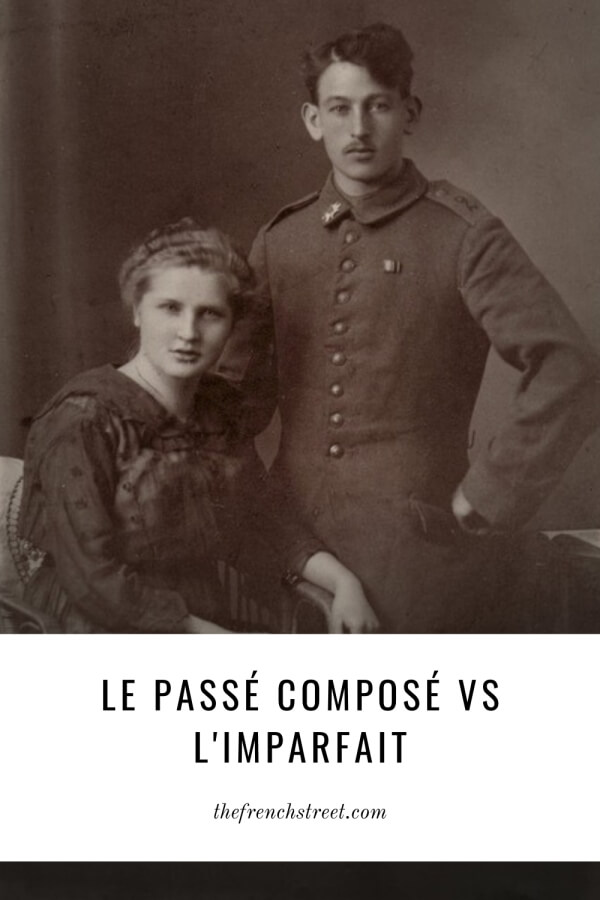When talking about the past in French, we normally use one of two grammatical structures: le passé composé and l’imparfait. French learners tend to confuse them in the beginning. Both tenses are used to talk about the past after all. When do you use each?
That’s why today we will talk about le passé composé vs l’imparfait. There are some guidelines that can help you determine when to use each. In French, it may not be a straightforward process as compared to English. But don’t worry. We will give you some tips as well as several examples so you know what the difference is. C’est parti!
Le Passé Composé
Let’s start with le passé composé. We use this structure to talk about completed actions at a definite time in the past and past actions at an indefinite time. To form it, we use the verbs avoir or être + the past participle of the main verb. Examples:
J’ai acheté une nouvelle voiture l’année dernière. I bought a new car last year. (definite time)
Il est allé à Paris. He has been to Paris. (indefinite time since we don’t know when that happened)
Nous nous sommes mariés il y a deux mois. We got married two months ago. (definite time)
Elle n’a jamais mangé de sushi. She has never eaten sushi. (indefinite time)
Although this structure is used to express the two concepts mentioned above, it is more commonly used to talk about completed actions at a definite time in the past. In other words, it’s the equivalent of the English simple past tense.
L’Imparfait
We use l’imparfait to talk about repetitive or continuous past actions/states of being. It is the rough equivalent of the past progressive tense in English.
To form this structure, we simply change the ending of the main verb. Such endings are -ais, -ait, -ions, -iez, and -aient. These will vary depending on the subject.
Examples:
Tim était un garçon timide à l’école. Tim was a shy boy in school.
Quand j’étais petit, je détestais le brocoli. When I was little, I hated broccoli.
J’allais au gymnase après le travail. I used to go to the gym after work.
Le Passé Composé vs L’Imparfait
How do we tell them apart, though? In a nutshell, the main difference between them is that we use le passé composé with completed actions, while l’imparfait is used with incomplete actions or actions at an indefinite time in the past.
The three main uses of l’imparfait are to talk about:
- Descriptions
- Habits
- Continuous past actions
On the other hand, a key concept with le passé composé is the presence of an action that is precise and completed.
In some cases, it’s easier to know which one to use by discarding your available options. You may not remember all the uses of X structure, but you might remember it’s not used in certain cases. For instance, if what you want to express doesn’t fall under a description, a habit, or a continuous past action, more than likely you will have to use le passé composé.
Using Both Structures Together
The best way to understand something is by looking at several examples. Below is a story that uses both tenses. Note the differences between them and the different concepts being expressed.
Quand je suis arrivé chez moi hier soir, mes parents étaient en colère. Mon père regardait la télé pendant que ma mère lisait un livre. Je leur ai demandé quel était le problème, mais personne n’a répondu. J’ai fait le dîner pour eux et ils se sont finalement réconciliés.
When I got home last night, my parents were mad at each other. My father was watching TV, while my mother was reading a book. I asked them what the matter was, but nobody answered. I made dinner for them, and then they were finally reconciled.
Did you notice the difference between the two structures? The more you practice them, the faster you will get used to them.
Indicators
Another thing you can look for is certain words or indicators that will help you determine which structure to use. Some of these words are normally used with le passé composé, while others are used with l’imparfait.
| Indicators used with le passé composé | |
|---|---|
| d’abord | first |
| ensuite, puis | next, then |
| enfin | finally |
| finalement | in the end |
| une semaine, un mois, un an | one week, one month, one year |
| un week-end | one weekend |
| le jeudi, le vendredi… | on Thursday, on Friday… |
| un jour | one day |
| un matin, un soir | one morning, one evening |
| toujours | always |
| plusieurs fois | several times |
| une fois, deux fois… | one time, two times… |
| soudainement | suddenly |
| Indicators used with l’imparfait | |
|---|---|
| autrefois | formerly |
| rarement | rarely |
| de temps en temps | from time to time |
| parfois, quelquefois | sometimes |
| souvent | often |
| en général, généralement | in general, generally |
| normalement, d’habitude | normally, usually |
| le matin, le soir | in the mornings, in the evenings |
| tous les jours | every day |
| le lundi, le mardi… | on Mondays, on Tuesdays… |
| le week-end | on the weekends |
| chaque semaine, chaque mois, chaque année | every week, every month, every year |
Conclusion
As you can see, using le passé composé and l’imparfait is not that complicated. They may intertwine at times and telling them apart will not be that straightforward. That’s normal. Just keep practicing, and you will master them in no time.
You will have to rely on context in many cases. Never ignore the context when deciding between these two structures as that is key to deciding which one you should choose over the other.
Well, folks, that’s all for today. I hope you enjoyed the lesson. Let me know your comments and questions below, and I will be more than glad to help. Au revoir!



Wow! I have actually found a great source of information. I used to learn French, for a couple of months and I don’t remember anything anymore, but I am getting ready to start learning again.
And here you are with your free lessons. Love that!
How do you know French? Did you learn it in school or you speak French as an official language in your country?
Hey, Sunny,
Cool! I hope you check out this site regularly to learn more about the French language and culture.
In answer to your question, I learned French a few years ago because I hated to watch French movies with subtitles. You can read more about my experience and motivation here.
Thanks for commenting.
I love how you have explained the grammatical structure of the French language and how certain words can intertwine that can make it difficult to tell.
Hi, Yvonne,
Glad you liked it! Feel free to check out my other articles to learn more about the French language and culture.
Thanks for commenting.
I am trying to learn Le Passé Composé and there are a lot of exercises I have been doing. Please correct me on these exercises.
Hier, Michel a rangé son bureau.
Il a décidé de ranger son bureau chaque semaine.
À quelle heure es-tu sorti ce matin?
As-tu sorti les carottes du frigo hier soir?
I am having trouble with grammar. Thank you very much in advance.
Hi, Abel,
Good job! All your sentences are correct. Keep up the good work!
Feel free to reach out if you have any more questions about French. Thanks for commenting.